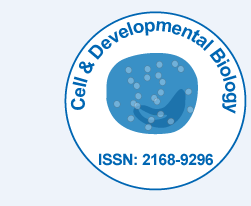
Cell & Developmental Biology
Open Access
ISSN: 2168-9296
+44 1478 350008

ISSN: 2168-9296
+44 1478 350008
Falana BA, Ogundele OM, Duru FI, Oshinubi AA and Falode DT
Aim: The role of alkaline phosphatase in cell metabolism and regulation is essential and cuts across cell proliferation, division, cell death, membrane transport and DNA cleavage. This study addresses the role and importance of alkaline phosphates (ALP) and Placenta Alkaline phosphatase (PLAP) in the cells of germinal epithelium of male Rat testes following induced lead (Pb) toxicity and rejuvenation by Selenium (Se) and Zinc (Zn) treatment.
Method: Adult Sprague-Dawley Rats (males) were divided into 4 groups of 15 animals each and were treated as thus; Group 1: Normal saline and serves as the control, Group 2: 100 mg/Kg BW of Pb only, Group 3: 100 mg/Kg BW of Pb and 2.25 mg/Kg each of Se and Zn and group 4 received 2.25 mg.Kg each of Se and Zn only. The duration of treatment was 56 days following which the animals were sacrificed by the 57th day and testes fixed in Bouin’s fluid.
Result: Pb induced toxicity could be apoptotic involving ROS activation of NO-dependent apoptotic pathway or necrotic involving a wide range damage by ROS induced lipid peroxidation. Selenium and zinc treatment ameliorated the damage induced by lead toxicity in the germinal epithelium.
Conclusion: ALP is involved in intrinsic regulation of DNA cleavage in apoptosis by functioning similar to endonucleases and also regulates membrane transport in perioxidated biomembranes. PLAP expression is minimal as tumorgenesis was not recorded, although Pb treatment showed signs of epithelium of endothelial cancer signalling, which was ameliorated by Se+Zn treatment.